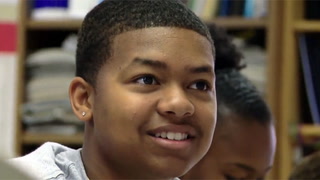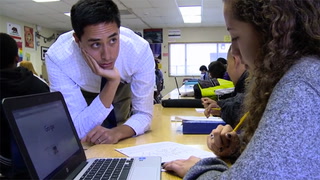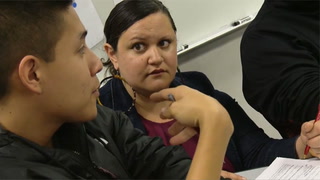Civic Engagement in the Digital Age Transcript
Male: Civic engagement we see as being critical for students learning how to make responsible decisions and collaborate.
Female: It's encouraging students inherently to see themselves as agents of change. It's not just that we're learning about these issues, but they are imagining themselves as part of the solution to this problem.
Male: I think civic engagement is teaching the standards. It's going above and beyond the standards. They're going to not only learn about their community but also start to transform their community.
What we really want to see in every classroom is a rigorous environment with kids really pushing their thinking that's linked to a community-based issue that also incorporates some work-based learning experiences where kids can start thinking about how they're going to apply the skills that they're learning, the thinking skills, the [saw 00:00:59] skills in the real world when they exit high school.
Male: What steps do you want to take to actually do something about that?
Female: You got to start in your neighborhood.
Male: The civic engagement work has given students a sense of agency, a sense of voice, and a structure to think about, "How can I actually do something with the things that I'm learning and to really see school as a springboard to community engagement as opposed to a report card grade?"
Male: You Tony, I think, were also suggesting something different of gaining allies, of reaching out to existing organizations like Black Lives Matter, and we know that they have an Oakland connection. That's also an action step.
Male: The digital revolution is really changing the ways in which politics are practiced. It's where young people go to get information. It's often where they get to express their view points or where they enter into dialogue. It's increasingly important that schools support young people in meeting some of the challenges that these new opportunities can present. For example, while it's true that people can go online and find information about just about anything, they can also go online and find misinformation, and it's really important for educators to help young people figure out how to tell what's credible.
Female: I think for a lot of our students, social media is a thing where you take lots of selfies, and people like them or comment on them or don't. I think the fact that in some of this work, we're giving other ways to interact with the internet. As an example, the fact that when they did community research, some of them did survey outreach, and students who they didn't know at all across Oakland took their survey about the experiences of being an undocumented student or the experience of being a foster care youth. I think that potential for making connections in that way has been exciting for my students.
Male: We find that when we really teach students about issues that they care about and we give them the opportunity to bring their lives into the conversations in classrooms, they're more engaged, they're more passionate, and they're more willing to invest in their education and see it as something that's relevant for them than if we weren't talking about these issues.
Male: Manifestations, contemporary problem, and root causes.
Male: Before EDDA, I felt like a lot of my students left my classroom feeling deflated. I was not setting them up to be more hopeful or engaged in our society. The focus of civic engagement that EDDA brought has been really crucial for keeping me motivated in my work and really providing that final piece of the puzzle for students of identifying problems, and now let's learn about how we can take action.
Male: In 2012, a group of us in the civic engagement research group began a partnership with Oakland Unified and with the National Writing Project to think about ways that we could expand access to civic learning opportunities throughout Oakland. In fact, our goal was to reach all young people in the Oakland high schools. The initiative is called Educating for Democracy in the Digital Age. Another big rationale for the initiative was that our research was showing that young people in different communities get differing amounts of the opportunities that matter when it comes to preparing people to be fully engaged and effective civil and political actors in their communities.
Male: What do you guys think about that?
Male: The EDDA initiative has 2 major components. The first is really about working with our teachers and supporting them to develop professionally around how to teach civic engagement in the classroom. The second major component of EDDA is really convincing people about the value and importance of civic engagement because most school districts do not focus on civic education right now. Part of our effort is to really convince people that this is something our schools need to be paying attention to, particularly in this era of high-stakes testing.
Male: One of the things that we did through the work and leadership of [yung-wah 00:05:00] and Troy was to expand the district's graduate profile from being preparing all kids to be college and career ready to preparing all kids to be college, career, and community ready. The district has responded by trying to create time and space and support for teachers in various schools to create curriculum and to work with young people to pursue those goals.
Male: We can create technology that will help people.
Male: The areas where I've seen students that are absolutely inspired to go make change in the world happens when they're addressing real issues in their community. If we can build a classroom environment that fosters that type of thinking, that's what this is all about.
Male: I think the most important thing for anyone who's really interested in doing civic engagement work in a community and a district is to really listen to teachers, to listen to students, to listen to families about what it is that matters to them and what they care about and to start from there. The initiative will grow out of the interests and passions of the community and their voices, and that's where that sense of empowerment will come from.














8 Comments
Nate Starace Jul 12, 2017 10:06pm
Reymond Michael Mar 1, 2017 1:42pm
samuel roni Mar 1, 2017 12:17pm
Skylar Dolezel Feb 14, 2017 8:52am
Jose Reed Jan 23, 2017 6:10pm